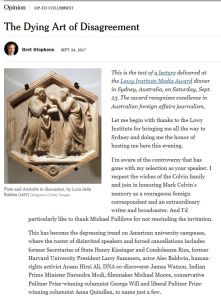
Bret Stephens
The Dying Art of Disagreement
The New York Times, 2017
What's inside?
Before we can find common ground, we need to learn how to disagree.
Recommendation
Issues like gun control, health care and abortion deeply divide Americans. The reason why people can’t find a middle ground on these issues, says New York Times columnist Bret Stephens, is that people no longer make the effort to understand other people’s viewpoints – a prerequisite for engaging in genuine debate. At a lecture given at the 2017 Lowy Institute Media Award dinner in Australia, Stephens emphasized the important role of the media in rekindling the “art of disagreement,” which he says forms the backbone of any liberal democracy. getAbstract recommends Stephens’s lecture to media professionals, educators, and citizens of all stripes and political persuasions.
Take-Aways
- Americans disagree on a wide range of issues but fail to discuss and engage their opposing ideas in a public forum.
- The great thinkers of Western civilization derived their ideas by questioning and quarreling with their intellectual adversaries. Such debating skills are crucial for a democracy to flourish.
- US public schools have been neglecting civic education, leaving students with little appreciation for basic civil rights, including the right to free speech.
- American college students have become increasingly intolerant toward other people’s opinions. To silence campus speakers, students have heckled them and even used violence on numerous occasions.
- The media can provide a platform for genuine public debate. They need to live up to their public responsibility by promoting discussion and representing different viewpoints fairly.
Summary
Political polarization is a defining feature of contemporary American politics. Republicans have become more right-leaning and Democrats more left-leaning since the late 1990s. Americans are also more likely to associate with and live near their fellow partisans and to consume news from sources that echo their political preferences.
“Our disagreements may frequently hoarsen our voices, but they rarely sharpen our thinking, much less change our minds.”
The problem, however, isn’t that Americans disagree about a wide range of issues. The problem is that they no longer engage and debate their differing viewpoints. Plato, Aristotle, Hobbes, Locke, and other great thinkers of Western civilization developed their groundbreaking ideas by questioning and quarreling with their intellectual adversaries. To do so, they needed to understand the ideas of their opponents and remain open to the possibility of changing their minds in the process. A liberal education teaches these critical thinking and debating skills, which are vital for democracies to thrive.
“In recent years, identity politics have become the moated castles from which we safeguard our feelings from hurt and our opinions from challenge.”
Unfortunately, US public schools are pushing civic education to the sidelines, leaving students with little appreciation for basic civil rights, including the right to free speech. In fact, free speech and debate are under attack on American college campuses. According to one survey, 51% of college students find it “acceptable” to heckle a speaker with a different opinion, and 20% of respondents condone the use of violence to silence a speaker. Some of America’s most prestigious liberal arts colleges have recently experienced both types of incidents. The rise of identity politics on college campuses and beyond has exacerbated Americans’ reluctance to discuss their opinions with people who don’t share them. For fear of offending somebody or being labeled a “bigot,” Americans thus deprive themselves of the opportunity to test their opinions and find solutions through vigorous debate.
“What makes our disagreements so toxic is that we refuse to make eye contact with our opponents, or try to see things as they might, or find some middle ground.”
The media today both mirror and reinforce America’s political polarization. Even-handed reporting has given way to promoting partisan viewpoints. Yet the media can provide a platform for genuine debate and discussion. They have an important civic function in educating the public about the facts underlining political arguments, representing different viewpoints fairly and questioning common assumptions. To keep democracy alive, media owners and publishers need to “revive the art of disagreement.”
About the Author
Bret L. Stephens is an op-ed columnist at The New York Times.
This document is restricted to personal use only.
My Highlights
Did you like this summary?
Read the articleThis summary has been shared with you by getAbstract.
We find, rate and summarize relevant knowledge to help people make better decisions in business and in their private lives.
Already a customer? Log in here.

















Comment on this summary